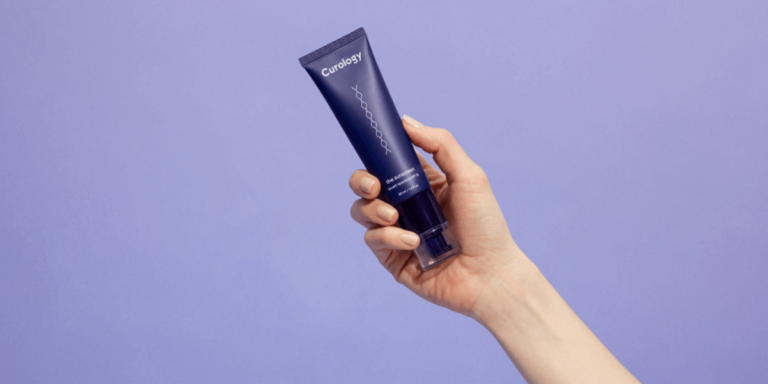How it works:
Share your skin goals and snap selfies
Your dermatology provider prescribes your formula
Apply nightly for happy, healthy skin
How it works:
How it works:
Share your skin goals and snap selfies
Your dermatology provider prescribes your formula
Apply nightly for happy, healthy skin
How it works:
Should you use products with sunscreen and insect repellent combined?
What you need to know about multi-tasking products.



Spending a gorgeous day at the beach can do a whole lot of good for your mood—but it can be a huge bummer if you end up with bug bites and sunburn. With all the time you spend outdoors in the summer, you might wonder if there are ways you can make protecting your skin even easier. For instance, can you safely use a two-in-one sunscreen and insect repellent?
Spoiler: It’s best not to! Here, Curology’s experts will explain why you’re better off using separate sunscreen and bug-repellent products rather than two-in-one options. They’ll also discuss additional personal protection strategies for preventing and treating bug bites and keeping your skin safe from UV rays.
Why you need sunscreen
Excessive sun exposure has immediate and long-term effects on your skin. Sunburns tell you that sun damage has set in. The symptoms generally go away within days, but repeated sun exposure increases your risk of skin photoaging and cancer.¹ A history of sunburns increases your risk of developing skin cancer later in life.²
Do you really need insect repellent?
Protecting yourself from bug bites won’t just stave off the itch. While most bug bites are harmless, some can spread serious diseases like yellow fever, dengue, and malaria. Proper protection against mosquitoes and other insects can help you avoid pesky bites and potentialinsect-borne diseases.³
The American Academy of Dermatology (AAD) recommends using bug repellents with 20-30% DEET on exposed skin and clothing.⁴ DEET is currently the most common bug-repellent ingredient on the market. But there are other insect repellent actives registered and approved by the US Environmental Protection Agency (EPA).⁵
Picaridin is a DEET alternative you may want to try. Studies show that picaridin’s efficacy as a mosquito repellent is similar to DEET’s at similar concentrations while being better tolerated on the skin.⁶ But picaridin products sold in the US are less concentrated than the formulas researchers use in studies, so you must reapply them more often.⁷
The American Academy of Pediatrics (AAP) recommends using DEET-based repellents with no greater than 30% concentration in children older than 2 months.⁸ The AAP also approves using formulas with up to 10% picaridin in children.⁹ However, manufacturers discourage picaridin use in babies younger than 2 years old.¹⁰
Can you use sunscreen and insect repellent together?
The Centers for Disease Control and Prevention (CDC) doesn’t recommend using combined sunscreen and insect repellent formulas—it advises using separate products instead.¹¹ That’s because sunscreen needs frequent re-application to stay effective. The AAD recommends applying sunscreen products every two hours or as stated on their labels.¹² Meanwhile, formulas with up to 30-34% DEET stay effective for up to 12 hours.¹³
So what happens to the effectiveness of sunscreen and bug repellent when you combine them? Studies have found that applying sunscreen and DEET together reduces the sunscreen’s sun protection factor (SPF). However, it doesn’t affect DEET’s repellent ability.¹⁴ By comparison, picaridin doesn’t change the efficacy of sunscreen.¹⁵
Applying DEET on the skin is generally safe. However, there have been rare reports of hypersensitivity following significant DEET exposure.¹⁶ While further research is required, a study on American adults found no correlation between blood DEET levels and immune, kidney, and liver toxicity.¹⁷

[Caption: Curology’s The Sunscreen is specially formulated for acne-prone skin.]
Sunscreen for acne-prone skin
The AAD recommends mineral sunscreen ingredients zinc oxide and titanium dioxide to people with sensitive skin.¹⁸ These ingredients provide effective protection against a broad spectrum of harmful light rays. They’re also less oily than other sunscreen actives, so they’re better for people with acne-prone skin.¹⁹
If you’re looking for a sunscreen that meets the AAD’s recommendations, consider Curology’s The Sunscreen. This zinc oxide-based formulation is dermatologist-designed, so it doesn’t clog pores.
Insect repellent for acne-prone skin
Finding bug spray that’s suitable for acne-prone skin can be challenging. In most circumstances, brands don’t release the full ingredient lists of their insect repellents. So, it’s almost impossible to confirm whether or not they’re pore-clogging or irritating. If you’re searching for a non-comedogenic bug spray for acne-prone skin, you can ask your Curology dermatology provider.
The EPA also has a handy tool called “Find the Repellent that is Right for You.”²⁰ Just answer some questions, including how much time you’ll be outdoors, what kinds of insects you need protection from, and which active ingredients you prefer. Then, the tool will show you a list of effective repellents that meet your requirements. You can check them against our list of potentially pore-clogging ingredients.
If you apply a bug spray without knowing the full ingredient list, you may rinse it off as soon as you’re back indoors. If you’re prone to body breakouts, you might want to use a cleanser like Curology’s Acne Body Wash to help prevent acne from popping up.
Other ways to protect yourself from insect bites
Besides bug sprays and lotions, other ways you can ensure adequate protection from insect bites include:
Avoiding places known to have outbreaks of mosquito-borne illnesses²¹
Physical barriers like protective clothing—including permethrin-coated clothes—and mosquito nets²²
Checking for ticks after going outdoors²³
Some changes to your daily routine may also help.²⁴ Try:
Avoiding bright clothing and certain scents
Cleaning up the insects’ breeding places regularly
Staying in a well-screened, well-ventilated area during peak biting hours
These measures may come in handy if you or members of your family—especially kids—don’t tolerate insect repellents well.
How to treat an itchy bug bite
Sometimes, despite your best efforts, bug bites happen. There are a few steps you can take to soothe bug-bitten skin, and it’s important to talk to your medical provider to see which of them may be right for you.
If you’re itchy, options generally include using a cold compress, applying an anti-itch cream, or taking an oral antihistamine. If your bite is painful, you might consider taking an over-the-counter pain reliever, such as acetaminophen or ibuprofen. See a medical provider in person if your bite worsens, particularly if you experience any sign of infection, such as increased swelling, warmth, redness, fever, or chills.²⁵
Take care to protect your skin
There are many ways to protect acne-prone skin from insect bites and the dangerous illnesses they can carry. A combination sunscreen-insect repellent just isn’t one of them—instead, choose separate products formulated without pore-clogging ingredients.
Get your personalized skincare routine with Curology
Get your personalized skincare routine with Curology


If you have any questions, feel free to contact your Curology provider. If you’re not already a Curology member, you can sign up for a 30-day trial* to receive your personalized prescription skincare formula. Start your skincare journey the right way with Curology!
FAQs
Picaridin is less irritating to the skin than DEET. Accidental ingestion of picaridin causes only mild eye or stomach irritation. Ingesting large amounts of DEET may cause neurologic toxicity in children.²⁶
It depends on the formulation. Different insect repellents have different active ingredients at different concentrations. The EPA recommends application and re-application according to product label instructions.²⁷
According to the AAD, children may start using sunscreen at six months.²⁸ Donna McIntyre, a nurse practitioner at Curology notes, “Since kids have sensitive skin, zinc oxide or titanium dioxide sunscreen formulations are goodchoices.” Total sun avoidance or using physical forms of sun protection is recommended for infants. It’s important to talk to your child’s pediatrician about sun protection.
P.S. We did the homework so you don’t have to:
Zagaria, M.A.E. Chronic and Acute Effects of Sun Exposure on the Skin. US Pharmacist. (2007, April 17).
Paul, S.P. Ensuring the Safety of Sunscreens, and Their Efficacy in Preventing Skin Cancers: Challenges and Controversies for Clinicians, Formulators, and Regulators. Frontiers in Medicine. (2019, September 4).
Centers for Disease Control and Prevention. Insect Repellents Help Prevent Malaria and Other Diseases Spread by Mosquitoes. (2021, June 11).
American Academy of Dermatology Association. Tips to Prevent and Treat Bug Bites. (n.d.).
U.S. Environmental Protection Agency. Skin-Applied Repellent Ingredients. (2023, February 21).
The Medical Letter on Drugs and Therapeutics. Insect Repellents. (2021, July 12).
Goad, J.A. Protecting Against Insect Bites. US Pharmacist. (2006, June 20).
The Medical Letter on Drugs and Therapeutics. Insect Repellents. Ibid.
The Medical Letter on Drugs and Therapeutics. Insect Repellents. Ibid.
Diaz, J.H. Chemical and Plant-Based Insect Repellents: Efficacy, Safety, and Toxicity. Wilderness and Environmental Medicine. (2016, January 27).
Mutebi, J. and Gimnig, J. Mosquitoes, Ticks and Other Arthropods. CDC Yellow Book 2024. (2023, May 1).
American Academy of Dermatology Association. Sunscreen FAQs. Ibid.
The Medical Letter on Drugs and Therapeutics. Insect Repellents. Ibid.
Webb, C.E. and Russell, R.C. Insect repellents and sunscreen: implications for personal protection strategies against mosquito-borne disease. Australian and New Zealand Journal of Public Health. (October 2009).
Fradin, M.S. “Picaridin” in Insect Protection. Travel Medicine, 4th ed. (2019, n. d.).
Chen-Hussey, V., et al. Assessment of methods used to determine the safety of the topical insect repellent N,N-diethyl-m-toluamide (DEET). Parasites and Vectors. (2014, June 3).
Haleem, Z.M., et al. Exposure to N,N,-Diethyl-Meta-Toluamide Insect Repellent and Human Health Markers: Population Based Estimates from the National Health and Nutrition Examination Survey. The American Journal of Tropical Medicine and Hygiene. (2020, May 26).
American Academy of Dermatology Association. Sunscreen FAQs. Ibid.
More, B.D. Physical sunscreens: On the comeback trail. Indian Journal of Dermatology, Venereology and Leprology. (March-April 2007).
U.S. Environmental Protection Agency. Find the Repellent that is Right for You. (2022, November 1).
Mutebi, J. and Gimnig, J. Mosquitoes, Ticks and Other Arthropods. CDC Yellow Book 2024. Ibid.
Mutebi, J. and Gimnig, J. Mosquitoes, Ticks and Other Arthropods. CDC Yellow Book 2024. Ibid.
Centers for Disease Control and Prevention. Preventing tick bites. (2020, July 1).
Goad, J.A. Protecting Against Insect Bites. US Pharmacist. Ibid.
American Academy of Dermatology Association. Tips to Prevent and Treat Bug Bites. Ibid.
The Medical Letter on Drugs and Therapeutics. Insect Repellents. Ibid.
U.S. Environmental Protection Agency. Using Insect Repellents Safely and Effectively. (2022, July 18).
American Academy of Dermatology Association. Sunscreen FAQs. Ibid.
Donna McIntyre is a board-certified nurse practitioner at Curology. She obtained her Master of Science in Nursing at MGH Institute of Health Professions in Boston, MA.
*Cancel anytime. Subject to consultation. Results may vary.

Curology Team

Donna McIntyre, NP-BC